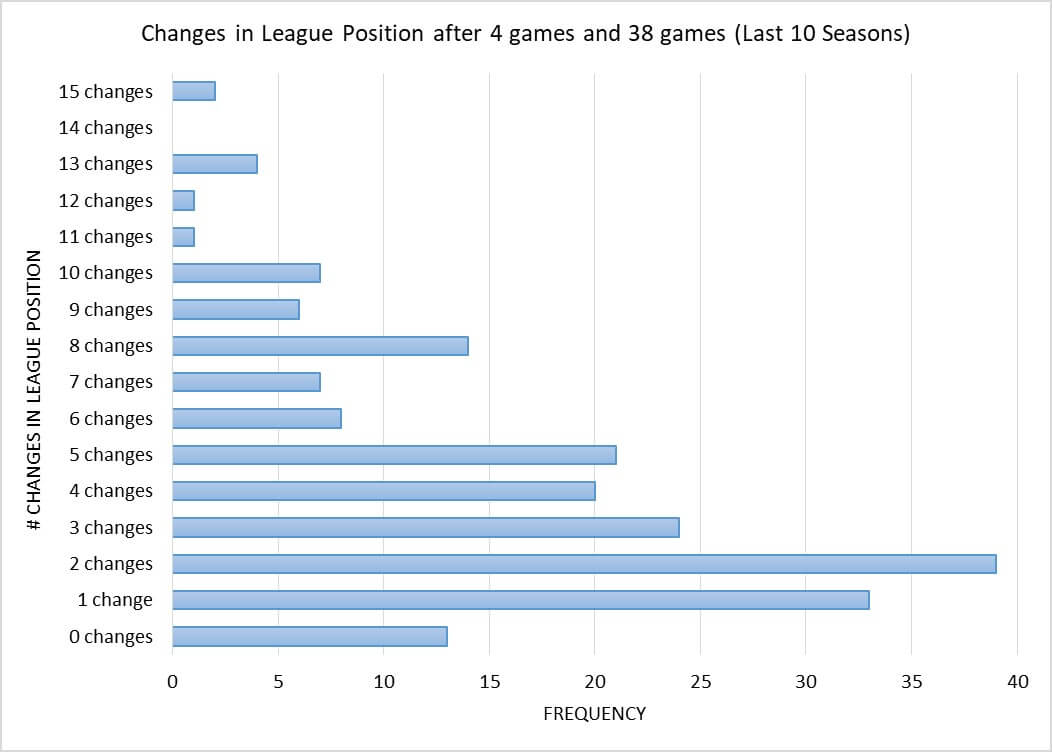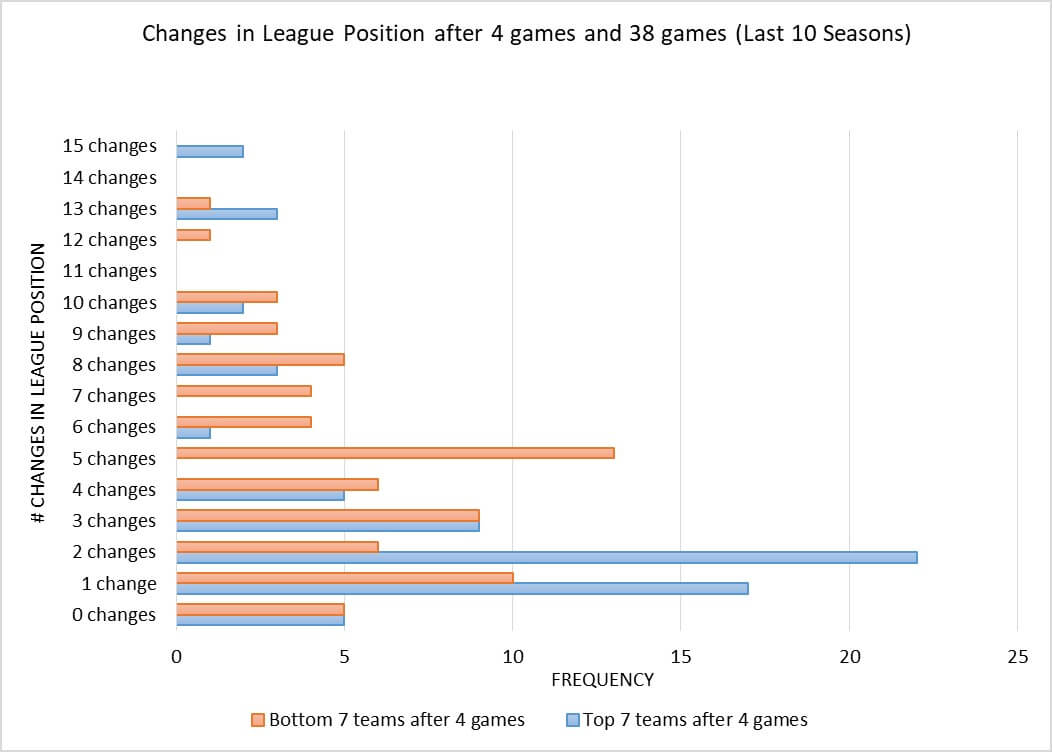When I was growing up following football in the 90s, BBC Teletext (remember, this is the pre-internet days!) didn’t produce a page for the Premier League tables until usually around the fourth or fifth league game of the season. The logic being – as all managers and players like to tell us during interviews – that it’s too early to be looking at it. It’s meaningless. Fast forward 25 years and it’s a little different. Apps and websites are updating in real-time from the first minute of the first match of the first weekend. I even heard one commentator during a recent Liverpool match suggest that, despite comfortably leading, Klopp’s men may keep pushing forward so as to boost their goal difference!
I’m not arguing against having them though. In fact, having tables before a ball has even been kicked is probably the only time I’ll ever see my team Aston Villa at the top of it (well, unless you are viewing one that refers to AFC Bournemouth by their official name). But the question remains: are they even remotely relevant? Can they tell us anything of interest with regards the rest of the season? With the international break upon us – and therefore the tinkering and trading of my fantasy team taking a little hiatus – I thought I’d dig into some numbers…
Changes in Premier League Tables
The figure above shows the change in league position after four games to the end of the season, for every Premier League team over the past ten seasons. You can see clearly that by and large, things don’t change drastically. The majority of the time (54.5%), a team will move no more than three places, and in only 10.5% of cases does a team move nine spots or greater. Perhaps more interesting, though, is how this differs when looking at only the top and bottom seven teams after four games…
Teams in the top seven after four games generally change position much less than teams in the bottom seven. That 54.5% number from the previous graph increases to 75.7% when looking only at the top seven teams, and falls to 42.9% when concentrating only on the bottom seven teams. If you’re doing well after four games, you’ve got a good chance of maintaining it. If you’re doing poorly after four games, don’t worry, plenty can change.
Some other interesting points:
- The team top after four games has only gone on to win it twice (Chelsea in 2014/15 and 2009/10), though they have always finished in the top four. Bad news for Liverpool.
- The team bottom after four games hasn’t been relegated since 2011/12 (Blackburn Rovers), whilst teams in the bottom three after four games have only been relegated 27% of the time. Good news for Watford.
- Of the 15 occasions in which a team has changed 10 or more spots after four games to the end of the season, 10 have been falls, with just 5 being rises. So a dramatic fall is more likely than a dramatic rise…even though in general, moderate changes are more likely with the slower-starting teams.
- Tottenham Hotspur has improved their position after four games eight times out of the last 10 years (2014 and 2010 are the only years they have fallen). You’d put good money on them making it nine from the last 11…
- Of the teams that have been in the Premier League at least five of the last 10 seasons, Crystal Palace is the most erratic: their positional changes are 3, 9, 3, 13, 7, and 7 (most recent first). Not a promising stat for Eagles fans…
- Chelsea has been the least erratic over the last ten years; they have never moved more than 3 positions after four games. Is 8th the best that Lampard can hope for this season then?
- The two teams to have moved 15 places after four games are Aston Villa in 2014/15 (2nd to 17th) and Blackpool (4th to 19th). Can Dean Smith reverse the past?
Whilst these numbers are interesting in themselves (or at least more interesting than the international break), I think they also have relevance for fantasy football strategy. By and large, a player’s fantasy values correlates nicely with the league position of the team they play for. This makes intuitive sense of course, but if you want evidence for just how quickly this can take shape, take a look at the top eight scoring players right now. You have the Liverpool quartet of TAA + the front three (Liverpool sit 1st) and Manchester City’s deadly trio of KDB, Sterling, and Aguero (City lie 2nd). Of course, there’s always an exception that proves the rule, and in this case, it’s everyone’s favorite Finn, Teemu Pukki, who has the second-most points so far, despite Norwich being in 19th place.
So what does this mean for this season?
Well, if we go on the past mark that 10.5% of teams will change dramatically (nine spots or more), that equates to two teams. Crystal Palace and Wolves perhaps? If you think so, then the strategy may be to target some of those underperforming Wolves players (Jota and Neves come to mind), or trade any Palace players you have whilst their value is high (Jordan Ayew, surely). And if we then assume after that, that most teams don’t change too much, does that mean that heading into the season we’ve been too dismissive of Sheffield United, and too kind to Watford? Should the likes of Norwood and Stevens be considered as viable long-term options, as opposed to guys who’ve just started well? And are Deluofeu and Doucoure set for a massively disappointing season? So many questions. It’s a good job we have another eight days to ponder them.
Do you pay much attention to the Premier League tables this early? Let us know in the comments below.
Looking for a better way to play Fantasy Soccer? Our Fantasy EPL 101 looks into the world of ‘Draft’ Fantasy EPL, providing details of how it works, and why it is the best version of the game!
Fantrax was one of the fastest-growing fantasy sites of 2018 and we’re not slowing down any time soon! With multi-team trades, designated commissioner/league managers, and drag/drop easy click methods, Fantrax is sure to excite the serious fantasy sports fan – sign up now for a free year at Fantrax.com.




